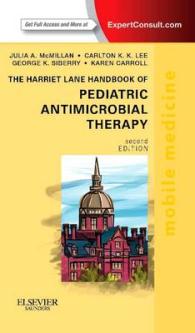- ホーム
- > 洋書
- > 英文書
- > Computer / General
Full Description
AI is revolutionizing healthcare, transforming diagnostics, treatment, and patient care. Applied Intelligence for Healthcare Informatics: Techniques and Applications explores cutting-edge AI solutions for disease prediction, medical imaging, mental health analysis, and healthcare decision-making.
Covering topics like heart disease prediction, COVID-19 detection, breast cancer classification, and ethical AI challenges, this book bridges theory with real-world applications. A must-read for researchers, practitioners, and innovators, it offers insights into the future of AI-driven healthcare.
Contents
1. Explainable AI-based Heart Attack Prediction Model using Various Machine Learning and Ensemble Learning Approaches. 2. Predicting Heart Block and Its Type using Ensemble-based Machine Learning. 3. Towards COVID-19 Detection Information System based on AIoT. 4. Tomato Leaf Disease Detection Using Convolutional Neural Network. 5. An Automatic Recognition System for Thyroid Nodule in Ultrasound Images using Convolutional Neural Network. 6. Malnutrition prediction among under-five children using Machine learning techniques. 7. Prediction of Depression Severity via Feature Grouping and Machine Learning with Burn Depression Checklist. 8. Comparative Analysis of Machine Learning Methods for Symptoms based COVID-19 Detection. 9. BCNet-11: A dilated convolutional neural network for breast cancer classification using histopathology images. 10. Age Estimation from Human Facial Expression using Deep Neural Network. 11. Detecting Depression from Social Media Posts Using Comprehensive Machine Learning Approaches with TF-IDF and N-Grams. 12. An Ensemble Approach and Comparison of LSTM, Bi-LSTM, and GNN Models to Predict Protein Secondary Structure. 13. Psychological Stress Prediction of Human Using Machine Learning Algorithms. 14. Face Mask Detection Using CNN: Ensuring Safety During COVID-19. 15. Approximating the Survival Possibility of Post Thoracic Surgery for Lung Cancer using Machine Learning. 16. Time-Frequency Analysis using fNIRS Signal for Pain Detection on Hemodynamic Response. 17. A Study on Different SVM Kernels with Suitable Pre-Processing Technique and Parameter Optimization for Cardiovascular Disease Prediction.








